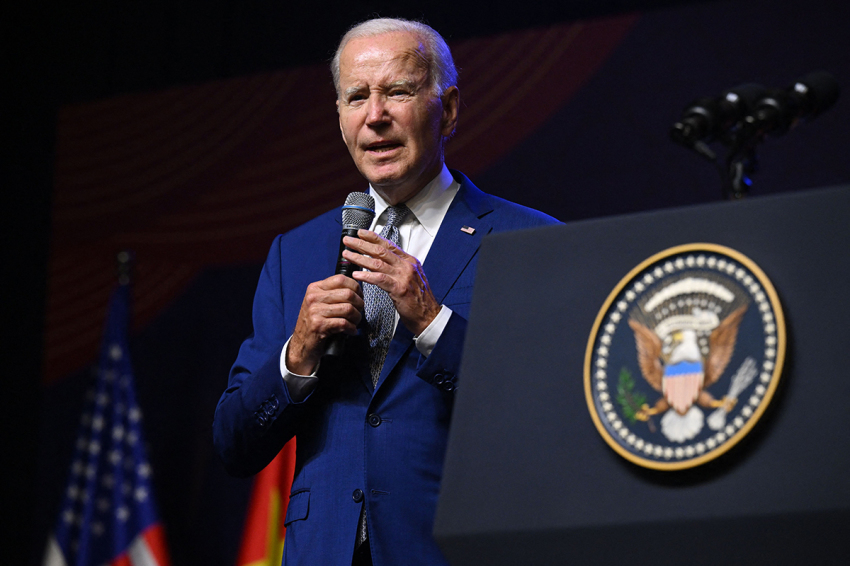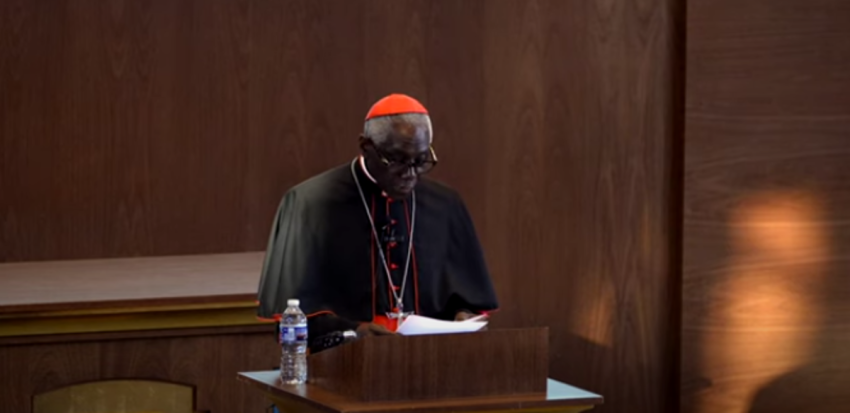Biden is a 'cafeteria Catholic,' Cardinal says in rebuke

A prominent leader in the global Catholic Church has become the latest to call President Joe Biden a “cafeteria Catholic” as he urges Church leaders in the United States to fully embrace Catholic teaching.
Cardinal Robert Sarah, who formerly served as the Catholic Church’s Prefect for the Congregation for Divine Worship and the Discipline of the Sacraments, gave a lecture titled “The Catholic Church’s Enduring Answer to the Practical Atheism of Our Age” at The Catholic University of America in Washington, D.C., last week. During his remarks, Sarah echoed the analysis of Cardinal Wilton Gregory of the Archdiocese of Washington by describing Biden as a “self-identified Catholic president” who amounts to a “cafeteria Catholic.”
Sarah, a Guinean prelate who has emerged as one of the more outspoken conservative voices within Catholic Church leadership, suggested that the phenomenon of “cafeteria Catholics” extends beyond the president and applies to many other “Catholic public officials.”
“Many of your Catholic hospitals and universities are Catholic in name only,” he added.

While Sarah did not elaborate on what he meant by the term “cafeteria Catholic,” Gregory defined the phrase as applying to anyone who “picks and chooses dimensions of the faith to highlight while ignoring or even contradicting other parts.” Gregory maintained that cafeteria Catholics often “choose that which is attractive, and dismiss that which is challenging.”
Gregory’s characterization of Biden as a cafeteria Catholic, which he made in an appearance on CBS’ “Face the Nation” on Easter Sunday, comes as the president has faced criticism for vocally supporting abortion throughout his career despite its clear contradiction with Catholic teaching.
Although Gregory expressed concern that Biden “steps aside some of the hot-button issues, or uses the hot-button issues as a political tool” and stated that such actions are “not the way, I think, we would want our faith to be used,” he did not explicitly mention the president’s position on abortion during his appearance on the program.
Nearly three months after Gregory’s use of the term cafeteria Catholic to describe one of his city’s most well-known Catholics, Sarah’s speech focused on the consequences of the efforts to reconcile Catholic teaching with contemporary culture. His address was sponsored by the Catholic Information Center, a Catholic bookstore in Washington, D.C., that often hosts speakers and events for the local Catholic community, and the Napa Institute that describes its mission as to “advance the re-evangelization of the United States.”
After lamenting “the loss of devout Christian living, our obvious Christian culture and, in the form of public dissent, sometimes even from high-ranking officials or prominent institutions,” Sarah called on bishops in the U.S. to “raise their voice and become clear [teachers] of the faith, witnessing by both word and holiness of life.”
“There is too much confusion circling the Church. And it is up to us, bishops, to provide clarity so the lay faithful can themselves be witness to the truth,” he asserted. He suggested that bishops have an obligation to “be a sign of contradiction to the contemporary world.”
Sarah cited the example of bishops in Africa offering a “historic witness to the faith in the wake of that misguided document Fiducia Supplicans” by pushing back against the declaration as an example of Church leaders successfully fulfilling that obligation.
Published late last year by the Vatican’s Dicastery for the Doctrine of the Faith, “Fiducia Supplicans” authorized bishops to allow priests to bless same-sex couples while stressing that “one should neither provide for nor promote a ritual for the blessings of couples in an irregular situation.”
The Vatican insisted that the document will allow the blessing of “couples in irregular situations and same-sex couples without officially validating their status or changing in any way the Church’s perennial teaching on marriage,” namely that it is a lifelong union exclusively between one man and one woman. Disapproval of “Fiducia Supplicans” within the Catholic Church extended beyond African bishops as more than 90 Catholic clergymen, scholars and lay people called on the Vatican to withdraw the declaration.
Ryan Foley is a reporter for The Christian Post. He can be reached at: ryan.foley@christianpost.com



























